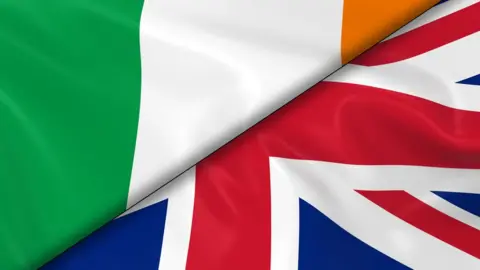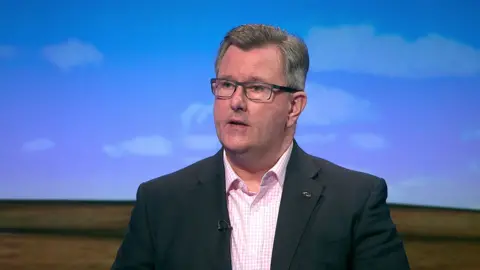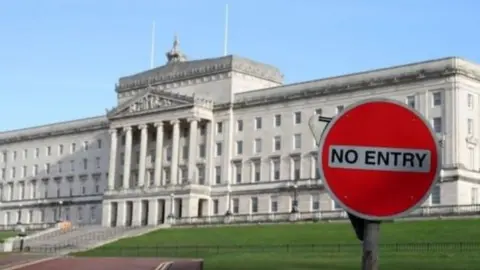Brexit: What is the North-South Ministerial Council?
 BBC
BBCCould the North-South Ministerial Council (NSMC) play a role in finding a solution to the Brexit Irish border deadlock?
This was the suggestion made by DUP MP Sir Jeffrey Donaldson.
Speaking to the BBC's Good Morning Ulster programme on Thursday, he said his party was not seeking a veto over European rules as part of a solution to the Irish backstop.

However, he said that "if new arrangements are proposed to deal with the consequences of Brexit for cross-border trade, the assembly is going to be part of that".
Those new arrangements, he said, could involve the North-South Ministerial Council.
The DUP has consistently opposed the backstop - the insurance policy to avoid a hard border between Northern Ireland and the Republic after Brexit, unless and until another solution is found.
However, it has recently softened its language on the backstop, saying it would be open to all-island arrangements.
Mr Donaldson's suggestion raised the prospect of the NSMC playing a role in managing those arrangements.
So what is the NSMC?
It is one of the institutions set up under the Good Friday Agreement, the peace accord that is widely seen as marking the effective end of Northern Ireland's Troubles.
The NSMC is the main body for cross-border co-operation between the governments of Northern Ireland and the Republic of Ireland.
It is attended by ministers from both sides of the border who oversee joint working in areas such as trade, food safety and agriculture.
It has not met since November 2016 because of the suspension of Northern Ireland's power-sharing government.
 Pacemaker
PacemakerWhy is the DUP talking about it?
The DUP has suggested it could accept some all-island arrangements after Brexit, such as a single zone for food standards.
In effect, that would mean Northern Ireland would continue to follow EU rules in that area while the rest of the UK would not.
However, the DUP has said the Northern Ireland Assembly would need to have some role in setting or implementing those rules.
It is not clear whether that would be a "Stormont veto" on incorporating new rules into Northern Ireland law or simply a right to consultation.
The DUP also suggested the NSMC would play a part in managing any new all-island arrangements.
Mr Donaldson said: "If you want to expand the areas covered by those arrangements then obviously that comes through the North-South Ministerial Council (NSMC) and the assembly.
"That's the way the (Good Friday) agreement in 1998 stated it should operate."
How does the NSMC take decisions?
The ministers attending the council remain accountable to the Northern Ireland Assembly and the Irish parliament respectively.
The Good Friday Agreement spells it out: "Each side to be in a position to take decisions in the council within the defined authority of those attending, through the arrangements in place for co-ordination of executive functions within each jurisdiction."
In other words, ministers are bound by whatever policies are set in Belfast and Dublin.
So does this just bring us back to the 'Stormont veto' issue?
It looks like it.
Mr Donaldson said that, currently, if you want to expand cross-border cooperation "that has to be approved by both the assembly and the Irish parliament".
He added: "That should continue in the event of new arrangements taking place.
"Our view is that if Northern Ireland in sectors like agri-food has to comply with EU rules, then there should be some line of accountability that ensures the assembly has a role if those rules change in the future."
